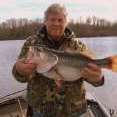I fish year round and see the red lips and crushers on bass in winter. Years ago after doing about an hour worth of reading on the internet and various bass forums on the question; " Why largemouth bass have red crushers and lips?" I was not able to find or come up with a definitive answer. Views were far ranging to include: bacterial infection, cold water redness, eating crayfish, eating lots of food and several other explanations. But I found no guaranteed scientific explanation on why bass have red crushers and lips. Plus, why is it that you only find this mouth coloration in the winter?, I mean bass eat craws in the summer too and that coloration is not there. Look at smallmouth bass, they eat tons of craws and they don't have read crushers in the summer. Nope, I'm not convinced that the coloration in the mouth of winter bass is from eating crayfish.
One year, believing bass were indeed hammering grayfish in winter and that's why they had this condition , I had been throwing craw baits on the bottom ~ one would believe that if ALL the bass we're catching have the redness from eating craws in the winter, they would just be all over these craw imitations but they are not. I have hopped imitations craws around for hours one winter with no interest from bass, yet throw a jerk bait and catch bass or a blade-bait for bass on the bottom.
So in my little rusted brain I'm not convinced that the redness in the mouth of winter bass is from eating craws as generally thought but rather a condition having to do with cold water and blood flow. The reddening appears to occur in the fish's tooth pad and crusher areas. Those are the two places in the bass's mouth having to do with taste and nerve receptors. That's how bass "feel/taste things before eating it ( they'll sure spit a lure out~ right?) These reddish areas in the bass's mouth in cold water seem to be the nerve, and sensitivity areas and used for tasting and feeling prey and these indicators need extra blood in those locations of the mouth. All bass seem to have this condition in winter.
-






